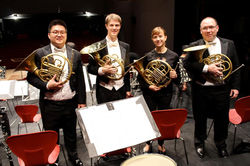
STORY OF A MUSICIAN
Scott Holben
Scott Holben was a member of the Macau Orchestra from 2010 to 2018 under the direction of conductor Lu Jia. with Holben has toured extensively throughout the world with the Macao Orchestra, performing in Japan, Korea, Taiwan, Myanmar, Austria, Switzerland, Portugal, and almost every Chinese province. Additionally, Holben has been fortunate to perform with many accomplished international ensembles, including the Seoul Philharmonic, the Hong Kong Philharmonic, the English National Ballet, and the Hyogo performing Arts Center Orchestra in Japan. Holben has also performed in many festivals, including the Bruckner Festival in Austria, the Shanghai Arts Festival, and Festival Mozaic in California. In the United States, Holben has performed with many orchestras, including the Colorado Symphony, the New Mexico Symphony, and the Louisiana Philharmonic Orchestras. Holben holds a Doctor of Music degree from Indiana University and degrees from Yale University and the University of Colorado. Holben’s inspiration stemmed from his principle teachers including William Purvis and Michael Thornton. Holben is currently the principal horn with the Columbus Indiana Philharmonic and Adjunct Professor of Horn at Purdue University Fort Wayne.

CAREER HIGHLIGHTS
PERFORMANCE
COLUMBUS INDIANA PHILHARMONIC -PRINCIPAL HORN
2018-PRESENT
LOUISIANA SYMPHONY ORCHESTRA – SECOND HORN
2017-2018
MACAU ORCHESTRA (MACAU SAR, CHINA) – SECOND HORN
2010-2018
PURDUE UNIVERSITY
FORT WAYNE
ADJUNCT PROFESSOR OF HORN
2021 - PRESENT
TEACHING
CONSERVATORY DE MACAU
INSTRUCTOR OF HORN
2017-2018
YALE UNIVERSITY
DEPARTMENT OF MUSIC
INSTRUCTOR OF HORN
2009-2010
TEACHING PHILOSOPHY
 |  |  |  |
|---|---|---|---|
 |  |  |  |
 |  |  |  |

As a teacher of horn, I aim to inspire students to become complete musicians and contribute to their art in a creative manner. Each student has a unique approach to learning and I engage students in a way that supports their strengths while building a solid foundation for lifetime growth.
Developing solid fundamentals is essential for building future success in music. Through a positive and structured methodology, we develop an array of tools to play the instrument well, understand music thoroughly, and share musical experiences with others. I foster the intrinsic passion of music in students and look for ways students can express themselves.
Goal-oriented learning keeps students focused as an extrinsic motivator and provides feedback for progress. I help students focus their ambitions into long-term goals. Along the way, we develop projects, assignments and other creative endeavors which provide benchmarks to ground their learning and give tangible markers of success.
Performances are key for developing a successful, well-rounded musician. They are both a creative outlet and also a benchmark for assessing learning. I live by example and perform for my students regularly. It is an opportunity for students to hear in practice what I teach. It continuously supports my own learning and growth.

Teaching


Teaching Example

Teaching Example 3

Teaching Example 2
Performances


Brahms: Horn Trio in E-flat Major, Op. 40

J. Defaye, Alpha - Scott Holben, Horn

Scott Holben, Horn
SCHOLARLY WRITING
HOW STUDENTS INCORPORATE THE UBIQUITOUS ACCESS
OF ONLINE VIDEO RESOURCES IN PRACTICE SESSIONS
Becoming an instrumental musician may be thought of as a process of both instruction and self-learning. The student’s responsibility, in the vast majority of the time a student is without a teacher, is to implement teachings into their playing. In music, this is mainly implemented in the practice room. Much of the job of a teacher then is to teach a student how to teach themselves (Tuckwell, 2002). The choices made by the student (with and without the guidance from a teacher) contribute to the student’s development. The hours students spend in the practice room, digesting information from their teacher, forming their own understanding, and developing a refined musical ideas is how students grow in their musical endeavors.
HEITOR VILLA-LOBOS: CHOROS NO. 4:
AN ANALYSIS AND INTERPRETATION
The sixteen Choros of Heitor Villa-Lobos written between 1920 and 1929 are considered by some, “the most significant contribution not only to the music of Brazil, but to twentieth-century music in general (Behague 72).” These considerations stem from the contributions that were made compositionally, defining Brazilian nationalism, and as a whole showcase the ideology of modernismo – “the glorification of the country in general through a total assimilation of its most nationalizing musical sources, within a perfectly synchromous, modern style of composition (Behague 74).”

INCLUSIVE STATEMENT
Scott Holben
Living and working in the Macao Special Administrative Region of China is a daily reminder of the diversity in our world. The organization I work for, the Macao Orchestra is an international community with musicians from over 20 nationalities. The thoughts, experiences and cultural background of each individual collectively forms a deep understanding of the world and a unique way to approach music. I contribute to the experience, and in return, it has helped shape my own understanding and commitment to diversity......

